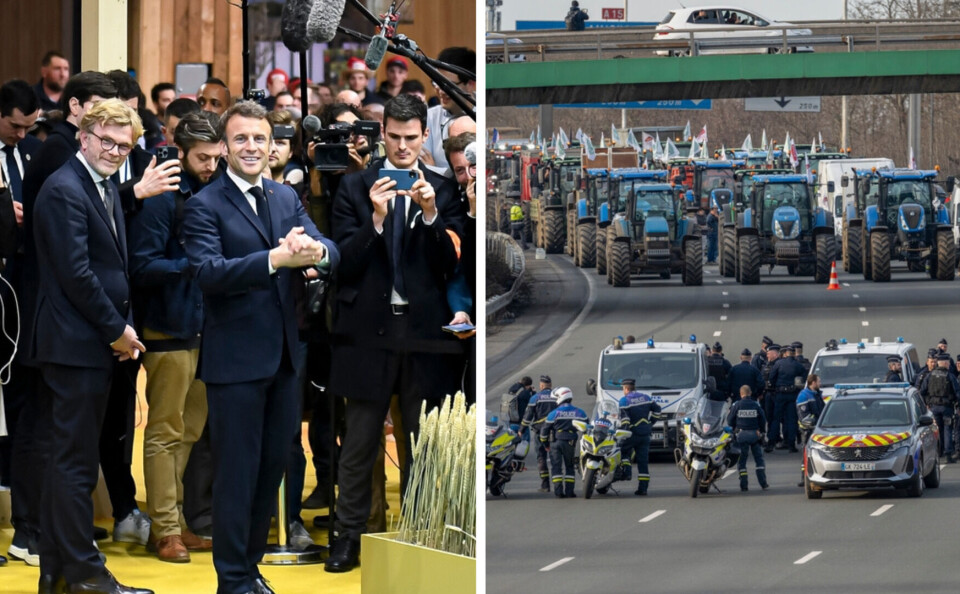-
Hosting scheme in south-west France lets newcomers sample lifestyle
Households in nine Dordogne communes volunteer under Mes Nouveaux Voisins scheme
-
French boulangeries demand right for staff to work on May 1 so they can open
Artisan bakery owners can work but employees cannot, while certain industrial bakeries are allowed to remain open with workers
-
How many Americans live in Paris - and where else are they choosing in France?
Over a quarter of all US nationals in France live in the capital city
French farmer protests restart: what is happening where?
Pressure mounts for solutions to calm the situation before the Paris International Agricultural Show starts this weekend

French farmers have resumed protests in several areas of France in a bid to pressure the government into action ahead of the Paris International Agricultural Show, which begins this Saturday (February 24).
Thousands of farmers from several unions caused widespread disruption during a wave of protests in January and February when they blocked motorways around the country.
The protests were initially sparked by the end to tax exemptions on special diesel fuel used in farming equipment, but also focused on the accumulation of environmental regulations, the payment of European grants, supermarket prices and competition from cheap foreign imports, which are not subject to French food production standards (on pesticide use for instance).
The government’s attempts to appease the unions ultimately led to the announcement of several concessions.
Read more: French farmer roadblocks start to end - but not all
However, the farmers’ unions are upset by, what they see as, the slow speed at which the government has followed through.
While they are not calling for the return of such a widespread movement, local protests have become more common since Monday (February 19) and are likely to intensify with the approach of the Paris International Agricultural Show.
Where are the Farmers protesting February 21?
⛺️ INSTALLATION DU CAMPEMENT SUR L'A62 !
— Résistance Paysanne (@ResistPaysans) February 20, 2024
Les paysans Tarn-et-Garonnais préparent le campement pour leur première nuit sur l'A62 où ils ont débuté le blocage depuis cet après-midi. Des renforts sont en route.#RésistancePaysanne #AgriculteursEnColere pic.twitter.com/9Gh8VgfJyZ
- The A62 motorway between Agen (Lot-et-Garonne) and Montauban (Tarn-et-Garonne)
- Rolling blockades around Dunkirk (Nord)
- Manure dumped in front of the prefecture in Châlons-en-Champagne (Marne)
- Manure dumped in front of the sub-prefecture in Reims, Vitry-le-François et d’Epernay (Marne)
- Supermarkets in Tarbes (Hautes-Pyrénées)
Why is the Paris International Agricultural Show so important?
The Paris International Agricultural Show, or Salon International de l'Agriculture, is one of the largest public trade fairs in the world, and in 2024 runs from February 24 to March 3.
Each year, it is attended by thousands of farmers, many of whom have animals with them, and visited by hundreds of thousands of people from Paris and around the world.
French politicians of all persuasions have come to use it as an occasion to burnish their public image and everyman credentials.
However, farmers unions have been warning for several weeks that they plan to protest at the event if the government does not speed up the delivery of concessions it promised on February 1.
“The show will be under pressure, and we will not be there just to flatter the government’s communication effort”, said Bouches-du-Rhone FNSEA president Laurent Depieds. “We will be there to hassle them and make our demands”.
Another FNSEA regional president from Doubs told FranceInfo that the union “cannot let the show happen as normal”.
No major protests have been announced for the show so far, however the FNSEA farmers union told BFMTV that 15 to 30 tractors “will do something peaceful and orderly”, with “food, music and a speech to remind people of our demands.”
“It will be the occasion for us to send a message to the President of the Republic that all we have done since autumn must result in clear decisions,” FNSEA national president Arnaud Rousseau told BFMTV. “The farming world can wait no longer.”
How is the government reacting?
They are keen to avoid angering the farmers.
The government has been quick to point out that it needs time to deliver the many concessions it made to farmers.
It says that checks on supermarkets and their pricing have been stepped up.
“We have performed 10,000 checks across 1,000 establishments and found 372 that did not respect the law,” announced Minister of Finance, Bruno Le Maire on February 21.
A new text for proposed changes to the EGalim law, central to some of the farmers’ demands, will be published by summer, according to Prime Minister Gabrel Attal.
Read more: What is France's EGalim law and why does it matter to farmers?
The government has also announced plans to ease the visa process for seasonal farm workers and to change the way it measures pesticide use. Details of these new measures have yet to be announced.
Read more
French farmers stage new protests around banks in south-west France
Fruit and veg prices in France: are imports always cheaper?
























